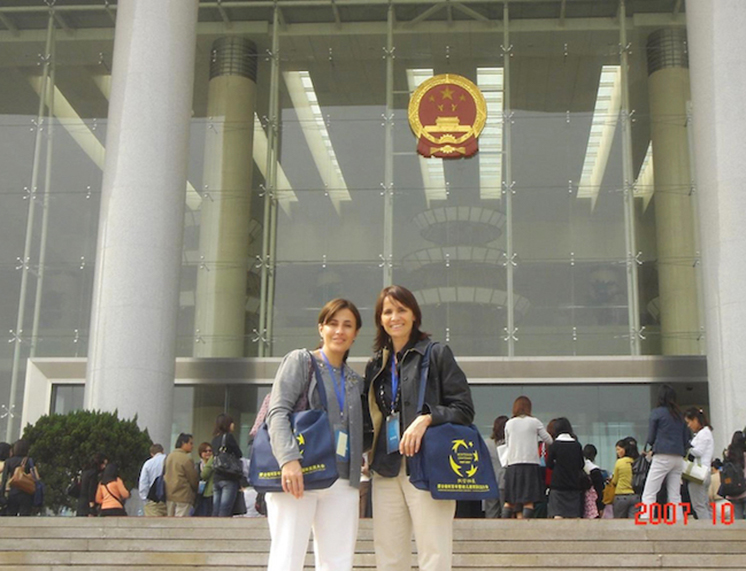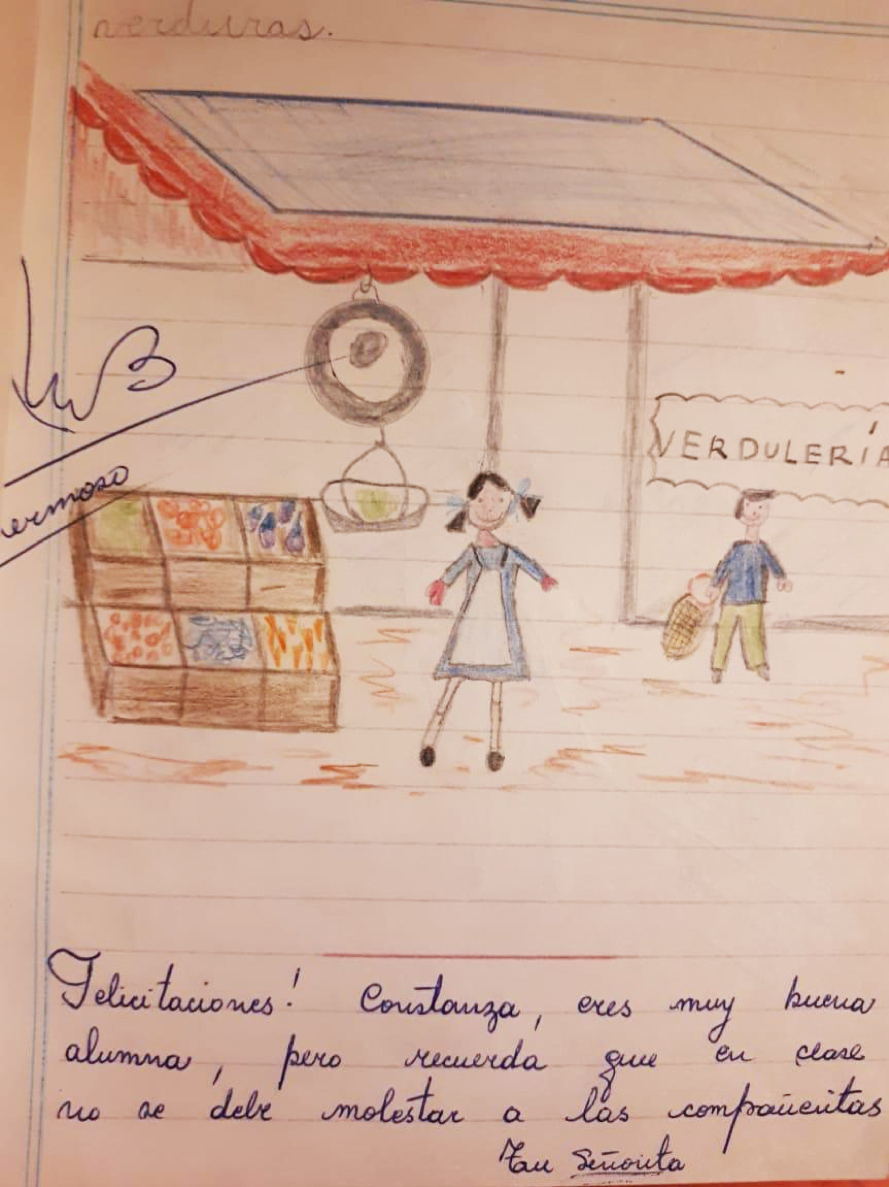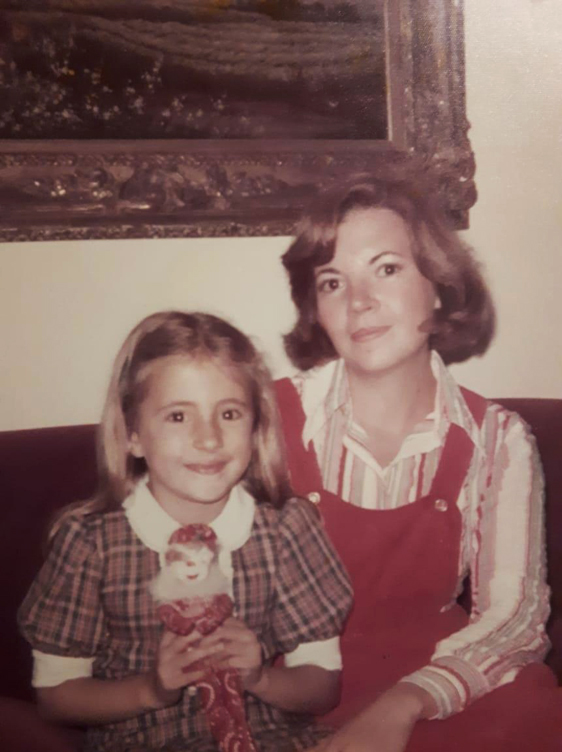
Connie Carballo and Marisa Sioli at China Centenary Congress, Hangzhou, China, 2007
“I was raised to think positively and to dream big!”
We know you will enjoy reading about Connie, a truly inspirational educator from Argentina!
Where in the world did you grow up, Connie?
I was born in the city of Buenos Aires, a place of many contrasts. It might seem a bit confusing, but Buenos Aires is the same name for both the capital city of Argentina and for the most important province in the country (it surrounds Buenos Aires city). The city of Buenos Aires is home to about 3 million people and the province of Buenos Aires to about 17 million.
Going back to my city of birth, in the city of Buenos Aires, there are sections in which a visitor can sense a strong European influence. In fact, my own grandfather came here from Spain around the year 1910. Our city welcomed immigrants from especially Spain and Italy at the end of the 19th century and at the turn of the 20th and continues to provide a home for different kinds of migrants today; it is presently hosting diverse communities from our neighboring South American countries and also from Venezuela. Buenos Aires enjoys a reputation of being tolerant and respectful of our fellow humans. There is a positive atmosphere that does not promote discrimination. Nevertheless, many economic contrasts exist alongside socio-cultural contrasts both in the city and in the province. With the passing of time both have developed slums, housing a large number of underprivileged people, including children.
When I was quite young our family moved away from Buenos Aires and stayed in an in-land city until I was 12 years old. I then returned to my birthplace, to live in a boarding school for a few years. As I am an only child, I am sometimes told that boarding school seems to have been an unusual choice for a child with no sisters and brothers, but I can tell you that I really enjoyed my time there. After that I went to a girls’ school which I enjoyed the most.

Can you describe one of your most precious childhood moments?
While trying to think about this question, what first came to my heart were two main remembrances: Being an only child I had numerous outings with my father at car races, and I was even given an electric train and lots of books, including what might have been considered “boys’” books such as Sandokan… One of the times I went to the theatre also came to my mind. I am very fond of theatre. By attending theatrical performances I feel that I discovered a whole new world, which was big and colorful and full of music.
What do you remember about your earliest school days?
Well, when I was six or seven years old, my mother was called to the school because the teachers there did not believe that I had actually written what I had, in truth, written. I was an early reader, and literacy skills were supported consistently in my home. I always demonstrated an interest in developing these skills. Sometimes my teachers wrote notes to my parents to let them know that I didn’t want to do what I was told or that I talked too much. In fact, there was a logical reason for this; I worked patiently and carefully, and often preferred to work towards the natural conclusion of a painting or a project before switching to the next task. Clearly, some of my teachers could not understand this! I still have some of those notes saved in my old school copybooks and they cause me amusement now, in my Montessori world.

Did one person in particular inspire you during your childhood?
This question is easy to answer. My mother opened up the world for me at a very early age. She was a very curious person, she loved knowledge (she spoke four languages, played the piano, she sewed and knitted, she learned how to use computers very quickly and also how to apply that to education -as she was a French teacher herself ) and encouraged some of this in me. We read a lot of books together; sometimes I would read an entire book in a single afternoon.
Reading for pleasure was a feature of our lives. When we came to Buenos Aires city from the in-land city we lived in, we dressed up and went to the theatre, museums, movies… These were always special events, and have left me with beautiful and lasting memories.
How does your childhood experience relate to the life you are currently living?
In retrospect I can see myself as a child that was open to the world, confident and outgoing. As an adult, I have developed that confidence and completely trust in myself and in the Montessori organization we have built in Argentina. We can achieve anything we aim to; that is my belief. I was raised to think positively and dream big, going step by step. I had a very rich childhood.
Please tell us a little more about what you do, Connie!
I am not the only person advocating for Montessori education here in Argentina. I am one of a group of cofounders of Fundación Argentina Maria Montessori/FAMM, who started this NGO with the conviction that we can help our country grow to be better through strengthening the experience of childhood for our country’s children. We knew that Montessori was the best way to do this. It has been a full-time job since 2007. We like to say it has become a full-life job, especially for Marisa Sioli and myself who have also the management responsibility. We make things happen. We feel we have been true pioneers regarding the promotion of Montessori in the country! We chose AMI as a way of providing quality Montessori education and we train people to work in learning environments, not just in Buenos Aires but in other parts of Argentina and in the rest of South America. We even received some students from the US and Europe. We already have over 900 AMI graduates from different age levels (most of the from 3 to 6) and we have also brought Montessori-based aging and dementia programs to Argentina twice.
Helping people start from scratch is something we are proud to do. We help individuals to reorient their lives and we have a deep commitment to people from underprivileged communities. We connect Montessori with other NGOs; there are already over twenty Montessori environments run by various NGOs in Buenos Aires and its suburbs.
Montessori Solidarity Network? What is this?
It is the heart of FAMM’s work. It is the way by which we bring together the different NGOs that offer Montessori environments (over 20 by 2019) in underprivileged communities.. FAMM gives them support though workshops to their teams and also to the mothers of the children, through scholarships to undergo AMI training, and donations, site visits and refresher sessions among others….
At an international level we feel Educateurs Sans Frontières is close to our hearts and to our mission. We had the fortune of being able to attend the Thailand EsF Assembly in 2015 and presented at the Mexico Assembly in 2019, which brings an opportunity to share ideas with other Montessori educators, many of whom are spearheading exciting projects on other continents. The Assembly allows us to network, to learn about other amazing projects worldwide and to brainstorm for the future. We feel deep gratitude to the incredibly inspiring Montessori world that AMI brings to us in every gathering it organizes.

